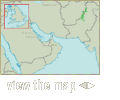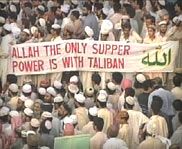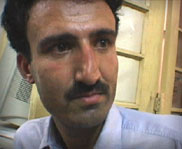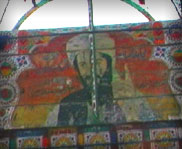|
+ "An American Informer" 3-4 September, Peshawar
from Martin Smith 
Update - A Courageous Journalist: On June 16, 2006, Hayat Ullah Khan's body was found in North Waziristan tribal region. He had disappeared in December 2005 after reporting that an alleged Al Qaeda member had been killed by a U.S. missile, not in a bomb-making accident as was claimed by Pakistan. Pakistan's journalist community and members of the opposition protested at the National Assembly and have demanded an investigation. Many believe Pakistan's intelligence agencies are involved in the murder.
 On Tuesday I awake depressed and anxious. My stomach is unsettled. I feel a little panicked. Rationally I know that our work is going as well as I can expect, so I assume this feeling has to do with the strain and exhaustion of the last few days of constant travel. I feel like going back to bed and waiting for my nerves to calm. But we have a busy day ahead. I tell myself that I will feel better as the day goes on.
On Tuesday I awake depressed and anxious. My stomach is unsettled. I feel a little panicked. Rationally I know that our work is going as well as I can expect, so I assume this feeling has to do with the strain and exhaustion of the last few days of constant travel. I feel like going back to bed and waiting for my nerves to calm. But we have a busy day ahead. I tell myself that I will feel better as the day goes on.
I don't.
By afternoon we have accomplished a lot. But I am still at loose ends. Somehow, by early evening I sink into an overstuffed couch at "Carpet World" and sip green tea while watching about eight Pesharwis unfurl kilims and pile weaves from Tajikistan, Dagestan, Turkmenistan, Afghanistan. ... I listen as the salesmen tell me all sorts of stories about the carpets, but they are creative storytellers and I enjoy being spun. They keep insisting that they are showing me "special" carpets.
 |  |
 |  |
 |
| Religious rally in the FATA. |
 |
"I don't show this to anyone ... just to you. It is from my personal inheritance."
"I don't want your personal inheritance," I protest.
"No, you must."
He wins. Time passes. And I leave "Carpet World" three hours later feeling much better. I've spent most of that time thinking about my apartment in New York, my wife, and my two sons. And I've refurnished our home for just a few thousand rupees. Shopping is therapeutic.
On Wednesday, I am awaiting the return of a Pakistani journalist named Hayat Ullah Khan with whom we've contracted to venture into the forbidden tribal areas. We have crossed into some such tribal zones in the north, but in the tribal areas south of Peshawar outsiders are strictly forbidden.
Until recently the area was even off limits for the Pakistani Army. Not until last October, when Al Qaeda fighters began escaping across the Afghanistan-Pakistan frontier into the tribal zone, did the central government of Pakistan forcefully attempt to police the area. Men in the tribal areas all carry Kalashnikovs. They want to be left alone.
 |  |
 |  |
 |
| Pashtun reporter Hayat Ullah Khan, who travelled into the FATA for FRONTLINE. Update: On June 16, 2006, Hayat Ullah Khan's body was found in North Waziristan tribal region. He had disappeared in December 2005 after reporting that an alleged Al Qaeda member had been killed by a U.S. missile, not in a bomb-making accident as was claimed by Pakistan. |
 |
They have long protected their sovereignty. The British Army was routed out decades before Mahatma Gandhi liberated India and what is now Pakistan. And during the rule of the Taliban in neighboring Afghanistan (1996-2001), the tribal areas sided with Mullah Omar, a.k.a. Defender of the Faith. The people are predominantly Pashtun, and fervent fundamentalist Muslims, and they considered the Pashtun Taliban regime theirs. To them the border with Afghanistan is artificial, drawn by the British through the middle of their lands. It's a border they don't acknowledge.
Technically, the Pakistani government in Islamabad considers the area autonomous, and has given it the misnomer "FATA," for Federally Administered Tribal Area. The federal government only provides some basic utility services and maintains a few roads and some schools. Law and order has traditionally been entirely a local affair.
Now comes the "War on Terrorism." Since the introduction of Pakistani soldiers in the FATA, there have been numerous skirmishes. A few months back, in the town of Azam Warzak, patrolling Pakistani troops came upon a nest of 35 "Uzbek and Arab foreigners." A shootout left 10 Pakistani soldiers dying and all but two of the Al Qaeda fighters escaping. The papers in Pakistan report daily on standoffs between the army and tribal elders over searches, check posts and patrols. In just the last few days tribesmen have marched down the streets of several towns chanting pro-Taliban, anti-American, anti-Pakistan slogans. "We will not give up any guests," they say.
Our Pakistani colleague is an extremely brave and determined reporter. He has returned with 14 hours of videotape. I spend a straight nine hours viewing this material, speeding though a few landscapes and sunsets, but mostly it is riveting material. Here is a rotting graveyard of British soldiers. Here, a sprawling Afghan refugee camp. On tape #4 there are gunshots as he drives a road that cleaves two warring tribes. Tape #7, a tribal counsel, or loya jirga, meets to discuss the harboring of Al Qaeda men. There is music, and men dancing with guns raised high, some twirling until they fall, writhing, to the ground. On this tape there is a truck with a six-foot portrait of Osama bin Laden painted beautifully, menacingly, on the tailgate doors. There are clandestine shots of Pakistani troops moving into a village where authorities say "Al Qaeda is hiding." And there is amazing footage of the troops firing rockets into ten homes, demolishing them. There is footage of bloodstained ground. And there is more I will not mention here.
 |  |
 |  |
 |
| A bus in the FATA, with Osama bin Laden's face painted meticulously on the tailgate. |
 |
Our colleague has been covering the tribal areas for years. He is intrepid. He has been arrested numerous times. Once while filming just over the border in Afghanistan, he was held for two days by American Special Forces. On another occasion, he was arrested by tribal police and accused of being an American informer.
"What did you tell them?" I ask.
"I tell them I am an informer." He smiles. "I am a journalist. I inform America with my reporting. But also the whole world. I am an informer. You are right."
He was released but only after having his tapes confiscated.
We have been more fortunate. He has brought back the first pictures of this area I have ever seen. Miram Shah, Wana, Janikhel. A few print reporters went into the North and South Waziristan tribal agencies in April and May, but since then the federal and tribal police have clamped down. Roadblocks are everywhere, manned by Army, Frontier Corps and tribal soldiers. There have been no datelines from the tribal areas since. We determined that for Scott or me or Marcela to go would be too difficult. We opted to give Hayat Ullah a camera and send him on his own. We drafted a list of locations and questions. We asked him to film road signs, proving where he was. And to interview tribal leaders.
I spend the entire day in my hotel room with him. This is a strange way to report a story but it seems to be my only option. We order tea from room service and keep watching.

< previous dispatch + next dispatch >

|
London
(Aug. 13-14) |
+ Zubaydah Is Dead
13 August, London |
+ Armchair Jihadists
14 August, London |
Gulf of Oman
(Aug. 15-21) |
+ Faces at a Dubai Mall
15 August, Dubai, U.A.E. |
+ HMCS Algonquin
16 August, somewhere in the Gulf of Oman |
+ On Board the Algonquin
17-18 August, somewhere in the Gulf of Oman |
+ Like an Elephant Chasing a Mouse
17-18 August, Gulf of Oman |
+ Dubai to Karachi
20 August |
+ A Firehose of Information
20-21 August, Dubai - Muscat - Chennai |
Pakistan
(Aug. 22-29) |
+ Old Hash
22 August, Islamabad |
+ Nuclear Neighbors
22-23 August, Islamabad |
+ We Believe in God
24 August, Islamabad |
+ Paranoid in Peshawar
27 August, Peshawar |
+ Bombs or Dust Devils
27-28 August, Peshawar |
+ Rumors and Half Truths
28 August, Peshawar |
Pakistan Border Lands
(Aug. 30-Sept. 4) |
+ On the Road to Chitral
30 August, Dir Khas |
+ Prisoners' Dilemma
31 August, Dir |
+ In the Northwest Frontier
30-31 August, Dir |
+ Border Town
2 September, Chitral to Arandu |
+ Don't Go to Timargarha
1-2 September, Drosh to Timargarha |
+ An American Informer
3-4 September, Peshawar |
Pakistan
(Sept. 5-23) |
+ Road to Nowhere
7 September, Islamabad to Faisalabad |
+ Faisal Town
7 September, Faisalabad |
+ Frustrations
9 September, Faisalabad |
+ The Plight of Women
10 September, Faisalabad |
+ A Little Noticed Gun Battle
10-13 September, Lahore-Karachi |
+ The Madrassa
14 September, Akora Khattak |
+ The Next Big Get
20 September, Karachi - Islamabad |
+ A Circle of Trust
21 September, Islamabad |
+ Indomitable
23 September, Islamabad |
Saudi Arabia
(Sept. 24-Oct. 2) |
+ Inside the Kingdom
24-25 September, Riyadh |
+ My Baffling Question
27 September, Unizah-Buraydah |
+ An Obedient Dissident
27 September, Buraydah |
+ An Audience with the Crown Prince
2 October, Riyadh |
Yemen
(Sept. 25-Oct. 10) |
+ Arriving in Yemen
25-26 September, Sana'a |
+ The Wedding Party
27 September, Sana'a |
+ A Talking Drug
28 September, Sana'a |
+ The World's Most Ancient Skyscrapers
3 October, Sana'a |
+ Americans Are Vampires
7 October, Sana'a |
+ Waiting for Rahma
9 October, Sana'a |
|